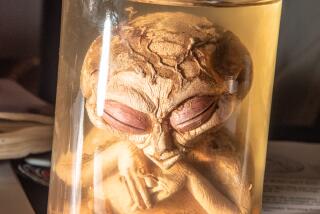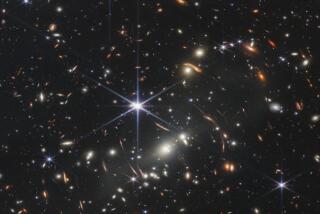BOOK REVIEW / SCIENCE : In Search of . . . Interplanetary Life : ARE WE ALONE? Philosophical Implications of the Discovery of Extraterrestrial Life, <i> by Paul Davies</i> ; Basic Books; $20, 176 pages
- Share via
For several decades now, human beings have had the technological ability to search for life elsewhere in the universe, and we have done so.
So far, however, the results of the radio search of the heavens have been zero. As far as we know, life on Earth is the only life there is. But it is far from clear whether “not yet” means “not ever.” The case can be argued either way, and there is a small library of books that have made the arguments and investigated the possibilities.
(For those interested in pursuing this question, “Intelligent Life in the Universe” [Holden-Day, 1963] by Carl Sagan and I.S. Shklovskii, though more than 30 years old, is still the best on the subject.)
In short, proponents of extraterrestrial life argue that there is nothing unique about Earth. There are so many stars and, presumably, so many planets in the universe that even if the odds are very much against it on any one planet, life must have gotten going elsewhere, just as it has here.
On the other hand, that same vastness of the universe presents a daunting problem: Where should we look? On top of that, the distances are so enormous that even at the speed of light, communication would most likely take centuries if not millennia.
Now comes Paul Davies, a professor of natural philosophy at the University of Adelaide and a prolific science writer, with a somewhat different question:
“What, exactly, would it mean for human beings to discover that they are not the only sentient beings in the universe?”
That is, suppose we beat the odds, discover other beings somewhere in the cosmos and actually exchange messages with them. “Would we be exhilarated or dismayed?” Davies asks. “Thrilled or scared? Inspired or demoralized?”
But before he gets to addressing those questions, Davies does have a fair amount to say about the underlying, threshold question--namely, what is the likelihood that such beings exist?
Davies thinks that it’s quite likely, and not for the standard, statistical reason usually given in support of that view.
He has argued elsewhere--and he repeats the argument here--that life, once started, does not evolve by blind chance, as traditional Darwinism asserts.
No, he argues, the laws of physics, as applied to biology, contain a fundamental organizing principle that leads from simple to complex. It is no accident that life on Earth evolved from single-celled organisms to you and me.
“The party line for biologists is that consciousness is just an insignificant accident,” he writes, “an incidental outcome of random mutational processes.” If so, then “any search for conscious extraterrestrial life is almost certain to prove fruitless.”
But for Davies, consciousness is an “emergent property” that is built into the laws of the universe, no less than the law of gravitation or the second law of thermodynamics. “The general trend from simple to complex, from microbes to mind, seems to me to be built into the laws of nature in a basic way,” he writes.
If you grant him that much (and it’s a lot to grant), then, “If consciousness is a basic phenomenon that is part of the natural outworking of the laws of the universe, then we can expect it to have emerged elsewhere.”
If so (another big if), Davies finds the likely existence of life elsewhere a thrilling fact, something to be welcomed and embraced. He argues that this discovery would knock the stuffing out of the standard scientific view that the universe and human life are pointless and that everything is just an accident of chemistry and physics.
No, Davies says, “the most important upshot of the discovery of extraterrestrial life would be to restore to human beings something of the dignity of which science has robbed them.”
Now, as for me, I share the view Davies opposes--namely that life is a pointless accident--but I do not feel in any way robbed of dignity as a result.
When Copernicus took the Earth out of the center of the universe, should people have felt robbed of dignity as a result? When Darwin showed that human beings were just the latest creatures in a long line of evolution, should people have felt robbed of dignity as a result?
Davies wants to reimpose a religious sensibility into these questions that science has finally managed to discard. Davies may find such thinking comforting. The standard scientific view finds it useless at best, dangerous at worst.
Whether or not we are alone in the universe is an interesting question that leads to interesting what-ifs and other speculations. If, for example, there are other life forms in the cosmos, what makes us so sure that they’d want to talk to us?
I do not expect to know the answer to any of these questions in my lifetime. But, unlike Davies, I do not feel any need to invent answers to be comforted against the cold, harsh universe.






